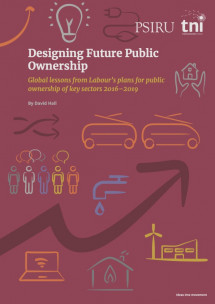Ideas into movement
Boost TNI's work
50 years. Hundreds of social struggles. Countless ideas turned into movement.
Support us as we celebrate our 50th anniversary in 2024.

This paper looks at the series of plans developed by the UK Labour Party under the progressive leadership of Jeremy Corbyn between 2016 and 2019 for re-establishing public ownership and operation of services and infrastructure which had been privatised over the previous 40 years.

All these are collective issues, which need public action: democratically planned public policies, a public sector raising taxes to finance the public spending, public services, and direct public productive capacity to transform economies and societies to deal with these issues. There has been a surge of political activity demanding such action, from the constant activity of the climate emergency movements, the demands of Black Lives Matter, strike actions by unions, and social movement campaigns. Relatively progressive political parties have won electoral victories, especially in Chile, Colombia, and Brazil in Latin America.
Political and electoral successes highlight the need for policies which actually strengthen public finance, services and capacity. It is therefore useful to look at cases where such policies have been developed and applied, to see what lessons can be learned to help develop policies elsewhere.
This paper looks at the series of plans developed by the UK Labour Party under the progressive leadership of Jeremy Corbyn between 2016 and 2019 for re-establishing public ownership and operation of services and infrastructure which had been privatised over the previous 40 years. This period included two general elections: in the 2017 election, contrary to all expectations, Labour won its highest share of the vote for many years, and the result was a ‘hung’ parliament; it then lost the 2019 election, which was dominated by the issue of Brexit, although most people supported the party’s policies for reversing privatisation and outsourcing (as discussed below in section 5).
This attempt to set out a practical roadmap of how ‘another world is possible’ may be of wider international interest, for four reasons: